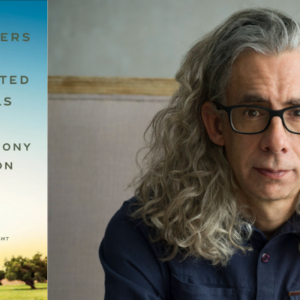
Facing That Which Haunts You: Ethel Rohan on Writing About Grief
“For most of my life, I’ve suffered in shame and silence while the men who hurt me got away scot-free.”
Noelle wasn’t my first dead body. But she’s the one with the most sticking power. More than three decades have passed since she died at age twenty-one and still a part of me remains nineteen years old, standing inside her family home on leafy Iona Road, Dublin, Ireland. I’m seeing her bloodless yet still lovely face for the first time and fighting an awful urge to laugh.
In that moment, one that stretched impossibly beyond the seconds marked by the tick of the moon-shaped clock on the mantlepiece, I fully believed Noelle would spring upright inside her white-lined coffin and giddily call out, “Got you!”
True to the traditions of an Irish wake, each mourner visited with Noelle inside that crowded, heavy living room, some touching her hands laced with brown rosary beads, others kissing her marbled brow, all undoubtedly imparting final words or issuing a prayer. I wish I could remember my last moments with Noelle, both when she was alive and while I stood over her in her coffin, but I cannot.
What I do recall beyond the stunning disbelief on first seeing her corpse, is her sister saying they had switched Noelle’s lipstick shortly after the undertakers brought her home.
“It wasn’t her,” Noelle’s mother said in a way that set the base of my throat restless.
“She had a long way to come,” someone else said, referring to Noelle’s transatlantic flight from New York to Dublin, alone among the jet plane’s cargo. Just as her mother’s core had carried her to birth, the belly of the aircraft had carried her to burial. I couldn’t stop thinking about the difference between those two dark places.
In that moment, one that stretched impossibly beyond the seconds marked by the tick of the moon-shaped clock on the mantlepiece, I fully believed Noelle would spring upright inside her white-lined coffin…
We repeated how senseless, how stupid, it was, Noelle dying from something as preventable as an asthma attack.
*
Sometime over the ensuing years, I reached a point where I seldom thought of Noelle. Until, that is, I started to draft my second novel, Sing, I. I never know where I’m going in my writing. I begin with a glimmer of the story and press on from there, word by word. In that way, I’m constantly surprised by what appears on the page. Perhaps never more so than in Sing, I.
I especially didn’t expect so many of my dead to reappear. A host of ghosts showed up. My parents, Noelle, the assaulted salesclerk from my childhood, and Nicole, a more recent dead friend and beloved San Francisco Bay Area singer and musician. That other, constant specter of loss and longing in my life also returned—the woman I would have been, the other life I could have lived, if I’d had a trauma-and-abuse-free childhood. Songs, too, came back to haunt me.
In the ’80s, Noelle and I sang and danced along to the songs of the Irish rock band Bagatelle inside the same living room where a few short years into the future the undertaker would seal the lid of her coffin closed with bright brass screws. Noelle’s and my favorite Bagatelle song was “Summer in Dublin,” which only added to the terrible irony of her avoidable death. Noelle died in November, in the depths of a New York state winter, far from sunshine, from home.
I played the song on repeat in the days and weeks after she was taken, a record that wouldn’t stop going round, a needle that wouldn’t lift. Those love lyrics to Dublin had already taken on more of a tremble once Noelle decided to move to America. I both hated that she was leaving and admired, envied, her taking the leap. “Summer in Dublin,” laced as it was with nostalgia for Ireland’s capital city and our homeplace, became our anthem for her daring to move to America. After she died, the song’s lyrics read like terrible foreshadowing that she was leaving Dublin, and us, in a more final way.
Three years after Noelle emigrated to America, I followed her lead and made my own bid for new terrain and another life. In the buildup to my departure, I suffered competing senses of dread and recklessness. Was I tempting fate? What if tragedy struck me too? What if I also died young?
That we only get one life countered such fears and ultimately fueled in me a “better to have dared” heedlessness. I thought what would Noelle give to sing and dance to Bagatelle one more time? To be among everyone and everything she loved for one more day? Life is for living. Doing. Giving. I boarded the Delta Airlines plane from Dublin to San Francisco via Atlanta and parted the clouds for Noelle.
*
As I continued to write that first draft of Sing, I, Bagatelle’s songs became part of an expanding compilation that I played on a continuous loop. Scene by scene, the transformative power of song formed the novel’s spine. Trauma calcified its skeleton.
Sing, I opens with a store holdup, an inciting incident drawn from my witnessing the same crime in childhood. The novel’s protagonist, Ester, is one of two employees at the store that fateful morning and during the armed crime her coworker suffers an asthma attack. At that point, thoughts of Noelle had yet to dawn on me.
It wasn’t until later in the scene, when Ester recalls her long ago college boyfriend who couldn’t get to his inhaler and had died from asthma, that I realized I was conjuring fiction from another true-life experience. Something I would continue to do throughout the novel, notably the very real ache to undo the death of loved ones and to be in a different life.
The culmination of Noelle’s influence in Sing, I though, and the story’s defining pull from my past, centers on the reclamation of women’s voices. In the novel, women let their voices and truth ring out in ways literal and figurative, including forming a choir and embracing their authentic selves. In my life, I found my voice in my thirties through writing, the antidote to how my Irish, working-class beginnings had silenced me.
Beyond the oppressive limits placed on girls and women by the Irish state and the Catholic church, I was also choking on secrets. Largely the secret of my mother’s paranoid and terrifying psychosis, the family friend who was sexually abusing me, and the boyfriend who was emotionally, psychologically, and on one occasion physically abusive.
At nineteen, I racked up yet another secret. The day of Noelle’s burial, my boss insisted I return to work immediately following the funeral mass, denying me the time to go to the graveyard and witness Noelle enter the earth. A month later, that same boss—his spongey face and congested laugh reminiscent of the pedophile who had abused me—groped me after a Christmas work party.
During the supposedly festive season that followed, I pushed away thoughts of my pervert boss and his insistent, kneading trespass, keeping schtum and thinking of Noelle and her being born in December. A gift. Holy. Thoughts of presents, and the sacred, came back to me during the making of Sing, I.
Noelle, all the ghosts who inspired the novel, brought something profound to the story and to me. For most of my life, I’ve suffered in shame and silence while the men who hurt me got away scot-free. My writing, and Sing, I in particular, became a means to my staring down those crimes and rising up from their wounds. The novel is my fight song.
*
How slippery, deceitful, is memory? I was about to write that I learned of Noelle’s death from my older brother, who called me on my mobile phone while I was walking down O’Connell Street. But that’s impossible in 1986. I must have met my brother in town that day.
I can only say for sure that I found out Noelle was dead on one of the most iconic streets in the heart of Dublin, within nose-shot of the stink of the River Liffey that Bagatelle memorialized in “Summer in Dublin.” I stopped stock still on the pavement, pedestrians and traffic blithely streaming past, my body, my brain, in the grips of a similar paralysis I’d experienced while being groped, abused, traumatized. If I didn’t move, think, speak, breathe, it wasn’t happening. I wanted to stay inside those crippling seconds for as long as possible, before having to emerge into the world without Noelle.
During Noelle’s funeral mass, her dad shakily read from the pulpit the poem “Immortality” by Clare Harner. It was my first time to hear the poem and it wrecked me. That poem, its heart-hitting last line, returned to me on January 2nd, 2021, the day I learned of the death of Liam Reilly, Bagatelle’s front man and main songwriter.
That gray, foggy afternoon in San Francisco, I took a break from the solitary act of writing Sing, I and inside my living room I blasted Gold: The Best of Bagatelle, dancing and singing along to all fourteen songs. Louder and louder I sang. Wilder and wilder I danced. Feeling alive. Feeling joy. Feeling free. I wasn’t alone either. For the lifetime of another spin of Bagatelle’s greatest hits album, Noelle had not died.
______________________________

Sing, I by Ethel Rohan is available via TriQuarterly Books.
Ethel Rohan
Ethel Rohan is the author of Sing, I (TriQuarterly Books, 2024), In the Event of Contact (Dzanc Books, 2021), and The Weight of Him (St. Martin’s Press and Atlantic Books, 2017).



















